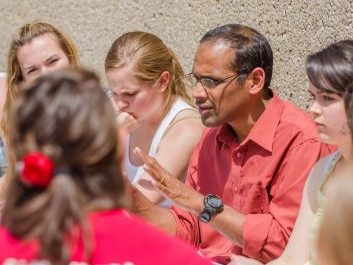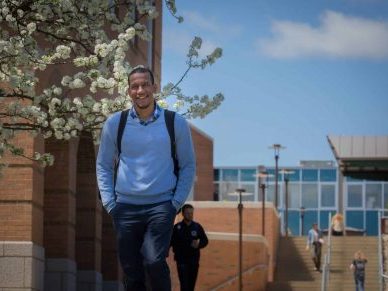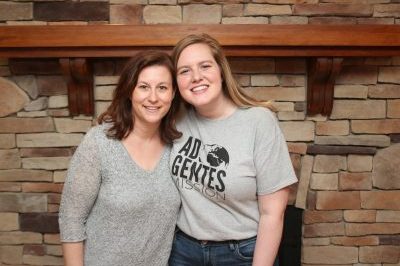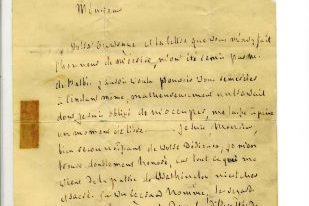In the final scene of his masterpiece novel, Brideshead Revisited, Evelyn Waugh captures the radically different nature of freedom Christians are called to embrace compared to the kind of freedom championed by the secular societies in which they live.
Legally divorced from their spouses, protagonists Charles Ryder—at that point an agnostic—and Julia Flyte—a “half-heathen,” in the words of her brother, Sebastian—are free to marry each other after a two-year adulterous relationship. Yet after the passing of her father, an event that should have conferred the family’s wealth to herself and Charles, Julia experiences a moment of deep and profound conversion.
She can’t be with Charles, she says, because choosing that life, a life that she has unlimited freedom within her society to choose, would mean shutting herself off from God’s mercy and choosing a lesser good than the ultimate good, which is God. And it would mean, they both realize, following a path for which they weren’t created.
Listening to the speakers at the Veritas Center for Ethics in Public Life Conference on the State of American Higher Education, one can’t help but think of Waugh’s novel and that call to choose not one of many courses that might appeal to us for a brief moment in time, but, rather, to choose a specific path to which God calls us.
Organized by Veritas Center director Dr. Anne Hendershott, professor of sociology at Franciscan University of Steubenville, and co-director Dr. Stephen Krason, professor of political science, the State of American Higher Education Conference did not glance over the many concerns facing higher education. The professors, scholars, and administrators speaking at the conference did not come to dispute an increasingly militant and leftward political slant of America’s leading universities, nor did they apologize for statistics that suggest the majority of college students prefer campus “safe spaces” over intellectual diversity, serious scholastic inquiry, and freedom of speech. When it came to matters of administration and bureaucracy, the speakers were the first to point out that many universities have become unwieldy, increasingly staffed with individuals more intent to expand a mission of social engineering than classroom instruction.
“For colleges, ideas and worldviews aren’t enough. Something more like paideia is necessary—a fully orbed formation about the person and not just the mind.”
And they did not sugarcoat the state of the liberal arts, which at many secular—and even religious—institutions has devolved into intersectional “studies” courses rooted in postmodernism, neo-Marxism, and what Franciscan professor Dr. Benjamin Wiker called “sophistry.”
What the speakers did offer, however, was a remedy for America’s higher education ills—a remedy embodied by universities such as Franciscan that emphasize the whole person formation of each student, guided by the same principles of virtue, tradition, and culture that illuminated both Athens and Jerusalem.
“For colleges, ideas and worldviews aren’t enough,” said Witherspoon Institute scholar R.J. Snell. “Something more like paideia is necessary—a fully orbed formation about the person and not just the mind.”
Armed with references to classical philosophy, Orthodox Jewish tradition, and modern Catholic thought, Snell spoke eloquently about how small, faith-based colleges and universities represent the greatest hope for the revitalization of not just the liberal arts, but higher education in a broader sense. It goes back, he said, to a tradition that originated in the classical world of Plato, Socrates, and Aristotle, and was further expanded by the early Church fathers and premodern theologians such as St. Thomas Aquinas.
“Such an education would provide, in keeping with one’s state, a rule or plan of life, so that time and space have a priori relations and meanings.”
What Snell advocated is nothing short of cultivating a unique personal vocation in each student, grounding that vocation within a vibrant and incarnate understanding of community and tradition that embraces faith, reason, and practical application. It is, on the majority of American campuses today, an alien assertion—one that rebukes the contemporary theoretical lenses of the liberal arts and, in the words of Wiker, returns to an idea of the liberal arts “rightly understood.”
“The goal of the liberal arts was philosophic, to have wisdom insofar as it was humanly possible,” explained Wiker, who teaches political philosophy at Franciscan. “This education was also meant to liberate the philosopher-guardians from the wiles of the sophists’ arguments, the sophists being the intellectual and moral relativists of Socrates’ day. We, too, want students to grasp the truth and to liberate students from the intellectual and moral relativism of our modern-day sophists.”
Liberating students from today’s modern-day sophists is easier said than done, especially as a consumerist mindset has gripped much of higher education. Speaking at the Veritas Conference, Patrick J. Deneen, professor of political philosophy at the University of Notre Dame, traced the roots of that consumerism to the ideas articulated by John Locke and Thomas Hobbes—philosophies that have inspired the liberal definition of freedom that much of Western society has embraced.
“Everything defaults to this kind of radical and free voluntarism,” said Deneen, who explained that Locke’s ideas about man in his “state of nature” have completely displaced the premodern notions of freedom based in virtue and excellence.
“Choice is completely unrestrained,” he added. “This transformation, more than anything else, informs the consumerist mentality at our institutions.”
“We, too, want students to grasp the truth and to liberate students from the intellectual and moral relativism of our modern-day sophists”
Echoing the thesis of his latest book, Why Liberalism Failed (Yale University Press, 2018), Deneen points to the primacy of choice as a key component in what he calls an anticulture—a distinct lack of a cultural formation in which tradition, virtue, and meaning, or telos, is replaced by a consumerism that encourages the ability “to not only make choices, but to remake and rethink and reverse choices.”
Deneen worries this anticulture not only encourages the spread of universities as socially constructed market entities, spurring everything from the proliferation of rising tuition to the rampant hookup culture and sexual violence at many universities, but that it informs and shapes curricula, where students are taught to view ideas, worldviews—even truth itself—as relativistic commodities. At many universities, even Catholic ones, critical thinking, so often a buzzword in academia, becomes nothing more than an exercise in detaching oneself from an idea or tradition.
The goal, nominally, is freedom and autonomy for the individual. But that freedom, detached from constraint or the self-governance emphasized by the liberal arts rightly understood, has had a corrosive effect. According to Deneen, increasing millennial rejection of religion, marriage, and free speech, as well as epidemic levels of loneliness and anxiety, flow in part from this misconception of freedom and, in particular, its pervasiveness on college campuses.
“What we’ve thought about for many years as a political philosophy that allows for a flourishing of pluralism is, in fact, an ideology that goes into our souls and shapes the kind of human being we are,” Deneen said.
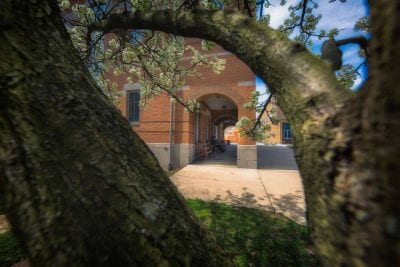
Choosing Excellence
Listening to Snell, Wiker, Deneen, and others at the conference, there’s a temptation to take an overly pessimistic outlook toward higher education. Certainly, none believe it will be easy to combat the consumerist framework that has pushed higher education to what many consider a crisis point, fraught with growing public distrust and declining enrollment numbers.
“A tremendously difficult and profound challenge,” said Deneen, who noted, “We’re all, in a sense, in the consumerist world—even those of us who would want to press against and reject it.”
Still, all are hopeful, even encouraged, that faithful Catholic universities such as Franciscan can be part of the solution.
“We should and we ought to have hope for what Catholic institutions offer as an alternative,” said Deneen, who explained that an authentic Catholic education based in the liberal arts rightly understood offers “a very different understanding of the human person; a different understanding of relationality and the kind of duties and obligations we owe to each other.”
“Catholics are not sectarians . . . Even a profoundly genuine Catholic education should prepare that person to contribute to his or her own society—not to withdraw from it, flee from it, or rise above it.”
For Wiker, the alternative Catholic universities can offer is something altogether incarnate. Noting how today’s modern-day sophists—not just the army of professors arguing against truth but all of the relativistic influences within Western society at large—rarely exist in the practical arts, he advocated for expansion of vocation-based programs alongside traditional instruction in theology, philosophy, history, literature, and the sciences. At the conference, he presented the example of a carpenter, an apt one in the Christian tradition, to demonstrate that intellectual relativism has its limits.
“The practical artisan has a deep, intimate knowledge of some aspect of nature, of reality, that no amount of merely verbal sophistic acrobatics can call into question,” said Wiker. “That is why, today, you don’t find in our community colleges sophists teaching welding, carpentry, dentistry, chemistry, or nursing as sophists—because the arts are defined by the realities of metal, wood, teeth, the chemical elements, and human bodily health.”
Likewise, Wiker proposed that more Catholic universities focus on forming students younger than the traditional college age, saying that, for much of higher education’s history, men in their middle teens went to college.
“Why do we wait until they are 18 to teach them such practical studies?” Wiker asked. “Why do we wait until they are 18 to try to save them from intellectual and moral malformation?”
Indeed, more and more colleges aren’t waiting to form students while they’re still in high school. At Franciscan, an online program called “Fast Track” gives high school juniors and seniors an opportunity to take foundational online courses in theology, philosophy, languages, and other subjects at discounted rates, allowing them to get a jump-start on their degree before graduating high school.
Understanding how Catholic institutions can be part of the solution may also involve a second look at Saint John Paull II’s apostolic constitution, Ex Corde Ecclesiae.
Gerard V. Bradley, professor of law at the University of Notre Dame and co-director of the Natural Law Institute, praised the 1990 constitution, which is often cited by faithful Cardinal Newman Society guide institutions such as Franciscan, but suggested its articulation of a large and faithful Catholic research institution—of which there may only be one or two real-world examples—needs updating.
“My reservations of Ex Corde Ecclesiae are that it’s addressed to only a small aspect of the education to Catholic young adults,” he said. “If we are going to go forward and renew the education of America’s Catholics, we will have to do that in structures far beyond the major Catholic research university. That means smaller colleges and institutes near campuses where the Catholic students are studying.”
Bradley doesn’t discredit Ex Corde Ecclesiae and its concern for the “dynamic creative and intellectual life of the faculty and how a Catholic university can be part of the larger intellectual life of a society,” but said the center of conversation needs to shift back toward how an authentic Catholic education informs and shapes how young people of faith go out into the world.
“There is a sense to choose an adult faith—but it’s the choice of a deep and profound formation. It’s not a coin flip. It’s the expectation you will come and embrace something that’s been given to you.”
“Catholics are not sectarians,” said Bradley. “We’re not Amish. Even a profoundly genuine Catholic education should prepare that person to contribute to his or her own society—not to withdraw from it, flee from it, or rise above it.
“It’s a challenge that’s not for everyone,” he added. “But for those who think they want to step up, it will be the most rewarding thing they’ve ever done.”
Deneen agreed with his colleague, saying there’s still a matter of choice at play for families who consider authentic Catholic postsecondary education. It’s a paradox that highlights the radically different nature of freedom for excellence as opposed to the classical liberal conception of freedom—one that can start in the home but ultimately must be embraced by each student in a formative college environment.
“Catholics, and people of other traditions, faith-based and otherwise, are faced with a paradox where if one wants to advance this concept of liberty for excellence, one has to do so in the context of a consumerist, liberal culture,” Deneen said. “There is a sense to choose an adult faith—but it’s the choice of a deep and profound formation. It’s not a coin flip. It’s the expectation you will come and embrace something that’s been given to you. To embrace a kind of inheritance.”
Living in Freedom
In stark contrast to the month before, when icy sidewalks and dark clouds hung over the Veritas Conference, early May brought sunshine and green to Franciscan University’s Steubenville campus. It also brought reflections from members of the Class of 2018, whose confidence in their formation and faith in God’s plan for their lives stood out as living examples for how a faith-based education, informed by the liberal arts “rightly understood,” allows students to flourish in the freedom for excellence championed by those at the conference.
Isaiah Schick, who will attend St. Francis de Sales Seminary as a seminarian for the Diocese of Superior, Wisconsin, this fall, explained how the formation at Franciscan challenges each student to discover his or her personal vocation.
“I really did experience a full human formation, including a deep sense of a personal vocation here at Franciscan,” he said. “Part of the deep trust in God that I learned during my time here carried with it an understanding that God has a unique plan for my life that is for my good and that of the whole world, and that my time at Franciscan served as a way not only to prepare for the future component of that vocation but also was an integral part of it.”
Colleen McInerney, who won the Father Gerald Odonis Award in Economics and plans to attend grad school at the University of Tampa, knows firsthand how Franciscan differs from the majority of universities, affirming the conference presenters’ insistence that universities must offer their students more than only a degree as a “signal.”
“Before I came here, I went to a state university for a year and was an economics major,” she said. “While I was there, I felt like I was just getting a degree as a signal that I was competent and could put up with economic principles. When I came here, I realized the school was really forming me as a whole person. I’ve learned not only to handle tasks but how to relate to people and how to be emotionally intelligent.”
McInerney stressed that a key component to the whole person formation emphasized at Franciscan is the community of faith maintained by the students, staff, and faculty.
“Discovery of my personal vocation at Franciscan involved many challenges through which I had to consciously choose to grow rather than let the experiences be wasted.”
“The community at Franciscan is very welcoming and encouraging,” she said. “That’s really important as a college student because not only are you building a foundation for which you’ll start to work and earn an income, but you have people who call you on spiritually and as a person.”
Mark Hanlon, who will attend medical school at Georgetown University this fall, echoed McInerney’s praise for community, saying, “Here at Franciscan, you are surrounded by a whole community striving for virtue.” Yet Hanlon, much like the conference presenters, stressed that there’s an element of choice for students to pursue virtue and growth—a choice that universities can help students make but ultimately cannot make for them.
“Growth is a choice each student must make for themselves,” said Hanlon, who retold a story about how Father Gregory Plow, TOR, told a group of freshmen they wouldn’t leave Franciscan the same people they came in as. “Discovery of my personal vocation at Franciscan involved many challenges through which I had to consciously choose to grow rather than let the experiences be wasted.”
Of course, the choices Hanlon talks about are not spur-of-the-moment, impulse-driven paths. Nor are they Deneen’s “coin flips.” Instead, there’s an entire support system of faculty and staff that, as management major Paul Herlihey said, help Franciscan students become “the best version of ourselves.”
Herlihey, who credited Nancy Ronevich, Franciscan director of Career Services, and Ron McNamara, coordinator of Student Leadership Development, with helping him land internships with ESPN and the NFL, said the combination of personalized, real-world mentorship and spiritual guidance helps Franciscan students develop a fully-formed idea of themselves and where God is calling them. He specifically mentioned spiritual direction with Robert Siemens, director of the Office of Evangelization, as helping him “develop an awareness of who I am, who I wanted to be, and who God is calling me to be.
“He taught me how to embrace the man I am and how to become the man I want to be through prayer, introspection, and virtue,” Herlihey added.
Above all, in an explicitly Catholic setting, the formation of young men and women must go beyond preparation for careers, discovery of personal vocation, and even discernment of what theologians would refer to as the “capital V” vocation. It must, as Hanlon reflected, call each student toward sainthood.
“Franciscan provides the space for students to listen to God in silence and prayer to discover what their narrative is,” said Hanlon. “Through the sacraments, adoration, and prayer opportunities offered, I came to see that all my activities were not disconnected experiences for a résumé. Instead, God has a story in mind for my life through which he will help me become a saint.”
